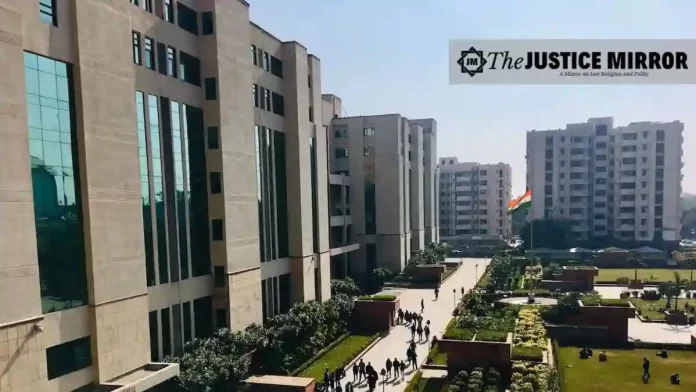As part of our first court Internship, we attended and witnessed the district court proceedings in two courtrooms of a District Court in New Delhi.
Contrary to our imaginations, the judicial premises was decked in modern infrastructure and pleasing ambiance with lots of energetic lawyers and litigants thronging its premises.
There were many young and erudite judges and lawyers busy in their litigation work in their respective courtrooms and chambers.
In a country like India where government departments and public offices are generally known for their lethargic attitude and notorious procrastination, we saw a glimmer of hope and optimism of a new India which is efficient, smart, and modern.
Courtroom I
We were primarily there to witness a check-bounce proceeding but also witnessed some other proceedings as well. Here, many counsels were seeking for adjournments and further dates. In one case the judge got annoyed and told the counsel that this will be his last adjournment.
He appeared careful so as to prevent happening of any kind of injustice due to successive adjournments and the resulting delay. It must be noted that Order 17 of the Civil Procedure Code of India 1908 provides for at most 3 adjournments only.
Courtroom II
Here we witnessed a cross-examination of a witness. It was a defamation case filed by a mother-in-law against her daughter-in-law. Both complainant and respondent belonged to a weak socio-economic background. The defence counsel was cross-examining a witness from the complainant side who happened to be some distant relative of the parties.
The shrewd lawyer tried to contradict the shabbily dressed poor witness who looked very innocent and confused. But the young lady judge was careful and circumspect in not letting the counsel put any unreasonable or annoying questions by promptly responding, “it’s wrong to suggest so and so...”. We liked her demeanour, jovial nature, and the empathy she had for the parties from not so privileged backgrounds.
Readers must notes that sections 151 and 152 of the Indian Evidence Act 1872 prohibit putting indecent, scandalous, or annoying questions to witnesses during cross-examination.
Inquisitive and Smart Judges
In both these courtrooms, we found judges taking an active interest in the cases presented before them and were eager to take them to their logical conclusions at the earliest convenience. Tarikh pe Tarikh appeared to be a thing of the past as judges in the courtrooms were reluctant to give adjournments and further dates without plausible and satisfactory reasons even though many lawyers displayed a keen interest in demanding more adjournments and dates.
Contrary to the popular perception that in a common-law countries judges only act as passive referees and moot spectators while counsels on both sides do the bidding, we found these judges in commanding positions who were putting a series of questions and cross-questions to counsels and clients on both sides.
And all of that did not appear to us mere procedural compliance but seasoned with good reasoning and logic. The Judges were smart and quick in detecting false excuses and lies put from any side.
It was undoubtedly a beautiful learning experience to be a part of all of this and has certainly strengthened our faith in the Indian legal system.
Conclusion: District Court Proceedings
In conclusion, we would like to say that if most courtrooms in India have started functioning in a similar manner as these two which we witnessed in the District Court, Delhi, then our Indian legal system is certainly moving in the right direction.
We hope that it keeps doing so while strengthening its integrity, transparency, accessibility, and efficiency. Efficiency both in terms of cost and time and integrity in terms of honesty and good faith should be the hallmark of any justice delivery system.
